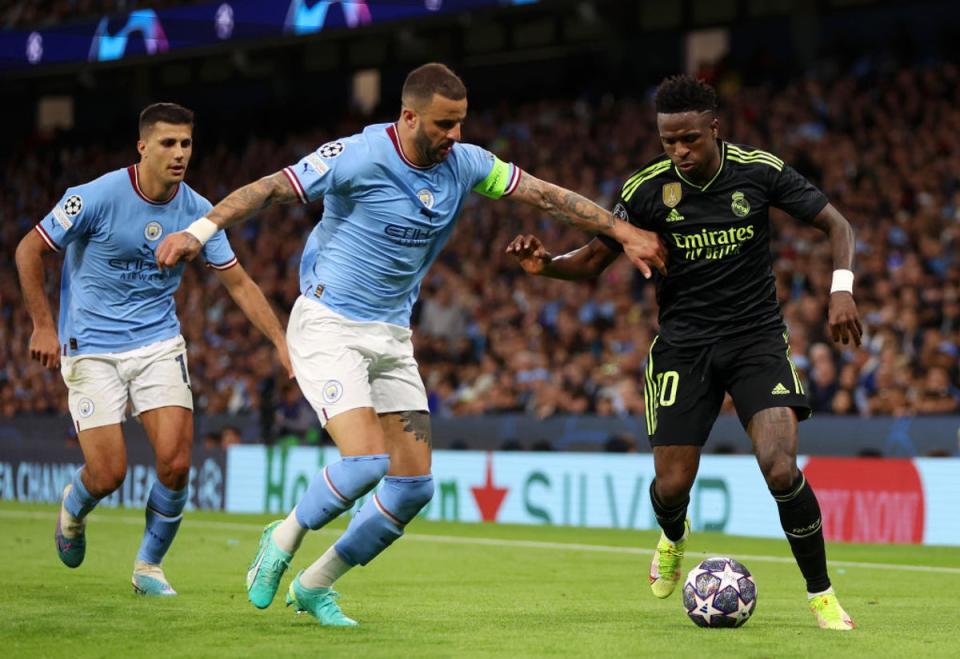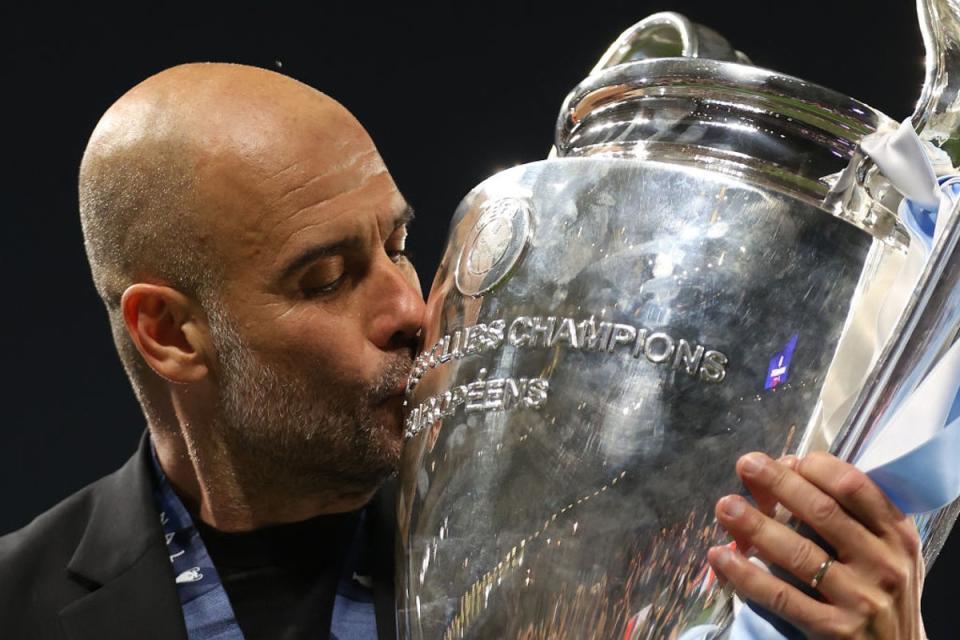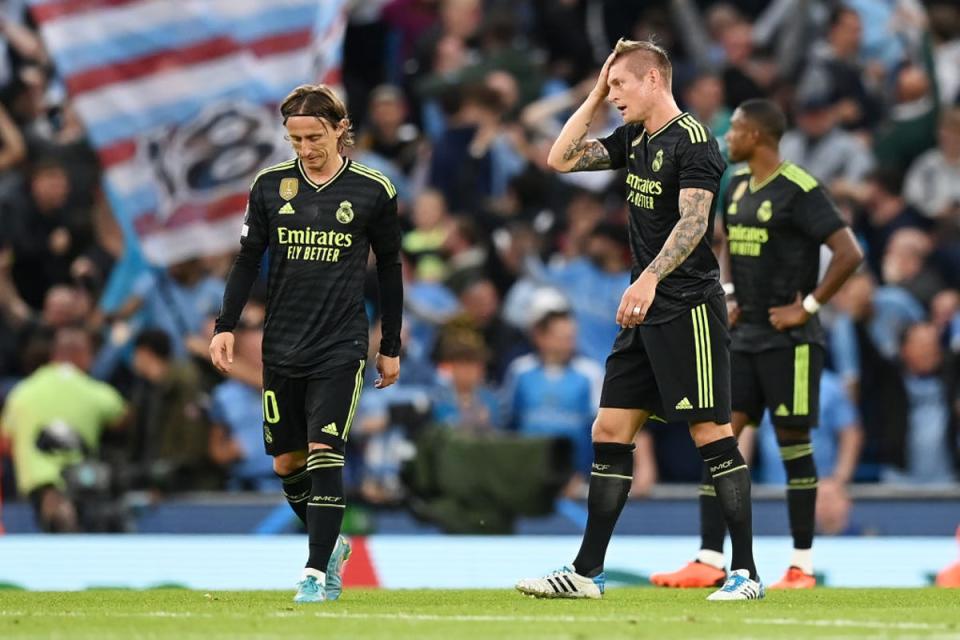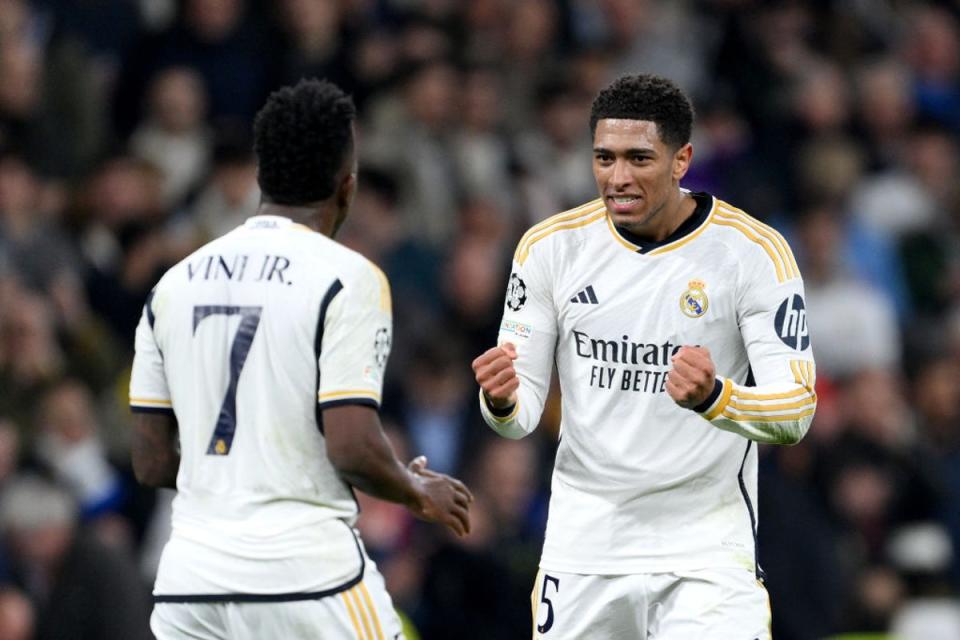How Real Madrid rivalry came to define Man City’s ascent to Europe’s best

A couple of years after their then chief executive Garry Cook had said Manchester City were on course to become “the biggest and best club in the world”, the scoreline suggested he had a point. It was September 2012, a year after Cook had resigned, and City’s second Champions League campaign was off to a spectacular start. With five minutes to go of their opening game, Aleksandar Kolarov scored with a free kick to put them 2-1 up. Against Real Madrid. At the Bernabeu.
Then came the comeback, Karim Benzema and Cristiano Ronaldo scoring. It would not be the last injury-time goal City conceded in the Bernabeu but it was an illustration of Real’s ability to strike back on behalf of the established order. City didn’t win a game in that Champions League campaign, propping up their group. Real got to their semi-finals; even that was scarcely a success by their standards.
As they return to the Spanish capital for a sixth visit in a dozen years, City have eight wins already in this season’s competition, 10 in a row since drawing at the Bernabeu last year. For all Cook’s bravado and City’s silverware, many would still anoint Real the world’s biggest club. Yet City’s treble last year gave them a claim to be the best team. But for the fact they were drawn against each other, they would probably be the two favourites now; even before then, each felt the likeliest side to stop the other.
If old money and new have taken different journeys to a similar destination, Real have been nemesis and antithesis more than role model for City.
Pep Guardiola grew up in a club which defined itself against Real: they had won six European Cups before he was born, he was a ball boy when Barcelona reached a first final of his lifetime, a midfielder when they belatedly became champions of the continent. Real, he said when the quarter-final draw was made, are the “kings of the competition”. For years, he argued an institution with such a track record had an inherent advantage. Even when City finally won their maiden Champions League in Istanbul last year, he deadpanned: “We are just 13 behind them. Be careful, Real Madrid.”

Two of Real’s haul of 14 came after eliminating City; the defining result of the Mancunians’ lone triumph was the 4-0 hammering of Real at the Etihad Stadium last May. Theirs is a story of three semi-finals: in the first and under Manuel Pellegrini, whose departure had already been confirmed along with Guardiola’s arrival, City were too timid, settling for the respectability of a 1-0 loss in Madrid, mustering only two shots in target over 180 minutes.
That 2016 triumph was the first of a hat-trick for Real. It illustrated their ability to prevail in their competition. If an era has been defined by both Guardiola and Barcelona, the reality is that, in the 16 years since he was appointed at the Nou Camp, both club and manager have won the Champions League three times, two of them together. Real have won it five times. That is their philosophy.
The most recent of those triumphs was in 2022. That capacity to find a way to win was demonstrated most dramatically against City. Guardiola’s team led a semi-final for 178 minutes and lost it, Rodrygo’s two goals in as many minutes bringing an astonishing turnaround. If it conformed to a theme for City, then specialists in tragicomic ways of not winning the Champions League, it also provided the context for last year’s 4-0, which followed a first-leg draw in Spain: demolishing Real ensured that this time, at least, there was no comeback.

City drew at the Bernabeu last season. Their lone win there can feel obscured: by the fact the return leg took place more than five months later, due to Covid, by the reality it merely facilitated perhaps City’s worst European night under Guardiola, the quarter-final defeat to a Lyon side who finished seventh in Ligue Un.
Yet a 2-1 in 2020, courtesy of a five-minute turnaround in which Gabriel Jesus and Kevin De Bruyne scored, was a breakthrough result of sorts. The loss to Lyon in the next round looks more of an aberration since then. It may have marked the start of City’s ascension to the elite level in Europe. Since then, they have been finalists, semi-finalists and winners in three subsequent seasons. Their now annual presence in the Champions League can be divided into three phases: the chastening group-stage exits under Roberto Mancini, a period of six seasons where they reached the knockout round but often lost to the first top team they faced, then a spell as genuine contenders.
And so they renew acquaintances with Real as equals and opposites. Barcelona have been more of a touchstone for City; understandably given that they took the hierarchy from the Nou Camp, in Ferran Soriano and Txiki Begiristain, laying the groundwork to get Guardiola. One of the peculiarities is that Real have the best English midfielder, in Jude Bellingham, City the outstanding Spanish one, in Rodri.

While City’s first buy of the Sheikh Mansour era was Robinho, a statement signing from Real, they have rarely tried to sign galacticos after Cook’s initial splurge. And City’s financial muscle is such that Real cannot raid them for their stars; there was long the theory that Sergio Aguero would have happily returned to the Spanish capital but he never did. Now Real seem to have an allure to Erling Haaland but that does not mean it will be easy to prise him from City.
Perhaps, then, a 21st-century rivalry will take place in the transfer market. Now there is an increasing familiarity on the pitch. Next week’s return leg will be their 12th meeting in 12 seasons: as many games as City have played against Sunderland in that time, more than they have had against Bolton or Blackburn, Leeds or Nottingham Forest, the two Sheffield clubs combined. Their fixture list has acquired a different look.
It could have been different. City were initially handed a two-year ban from the Champions League in 2020, 11 days before Jesus and De Bruyne struck at the Bernabeu, though that was later overturned. Real were the ringleaders among the Super League plotters. Instead, they have become the Champions League’s annual battle, perhaps their dominant duopoly. And as he has for much of his playing and managerial career, Guardiola is pitting himself against Barcelona’s old enemies. Be careful, Real Madrid.

 Yahoo Sport
Yahoo Sport 



































































